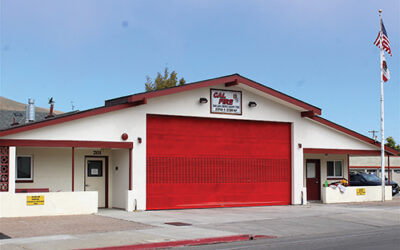San Luis Obispo County has extended once more a moratorium on spreading human “biosolids” on agricultural fields, the fourth time the temporary moratorium has been extended.
Chapter 8.13 of the San Luis Obispo County Codebook established an interim moratorium on the land application of treated sewage sludge or “biosolids” and was first entered into the books in 2004 and has been extended repeatedly since.
The last extension was due to expire at the end of next March (2021) and with this new extension, it’s now good until March 31, 2026, some 5 years, unless a permanent ordinance is approved to replace it.
But there’s not a lot of hope in that happening, as the County’s original draft ordinance got bogged down in 2015, when it was determined that the environmental impact report would cost $200,000 and not one of the local cities or sanitary districts was interested in pitching in, as such an ordinance would greatly affect how they dispose of biosolids from their treatment plants.
It’s a complex issue that frankly smells bad no matter what gets proposed.
In 1998, a proposal to spread treated sewage sludge on fields in San Miguel triggered action by the County Health Commission, followed a couple of years later by the formation of a Board of Supervisor’s Task Force and the eventual drafting of an ordinance in 2014.
The issue boils down to whether the components contained in wastewater treatment plant byproducts are safe to use for fertilizer, the way farmers use cow manure and chicken guano to replenish and amend the soil?
With little guidance from the State or Federal governments covering the matter, the County’s efforts have gone through a series of leaps and stumbles, so far as getting a permanent ordinance passed, a folly aped somewhat by the State’s efforts at the same nagging issue.
On one hand, biosolids recycling is in keeping with some of the State’s tenets of ecology — i.e. using natural materials instead of chemical fertilizers — as well as requiring a high level of sludge and thus encouraging the highest level of treatment.
It’s much cheaper to sell or even give away sludge to local farmers to use locally than to truck it to a biohazard facility. Sludge application on land was common practice here until the 1998 San Miguel project awakening.
Some plants, including the Morro Bay-Cayucos plant in the past, compost their sludge, mixing it with organic materials like plant and tree cuttings from parks, grinding them up together and selling or giving it away to the public.
The Morro Bay plant no longer does this and instead pays to have its sludge hauled away. The new Cayucos plant will too, sending it to the local landfills as cover material.
The County’s temp ordinance allows land application of sludge if it’s within “historical amounts of Exceptional Quality biosolids” a designation that’s almost impossible to meet with the current sewage plants in operation. Still, the Morro Bay-Cayucos plant normally produces a high quality of sludge but it isn’t “exceptional.”
“Since enactment of Chapter 8.13 in 2004,” a County Health Agency staff report said, “there has been no land application projects submitted” to County Environmental Health, the agency that enforces the ordinance.
But there is also now growing concerns about other components in the waste stream, in particular the stuff that makes your eggs slide right off the pan at breakfast.
As of this past July, all publicly owned treatment works or wastewater treatment plants statewide are required to “test for per- and polyfluoroalkyl substances [PFAS] as they are potentially significant receivers of these substances and, in turn, may be potential dischargers via biosolids,” reads the County report. “According to the CDC, PFAS are a group of chemicals used to make fluoropolymer coatings and products that resist heat, oil, stains, grease, and water.
“Fluoropolymer coatings can be used in such varied products as clothing, furniture, adhesives, food packaging, heat-resistant non-stick cooking surfaces, and the insulation of electrical wire. Many chemicals in this group, including perfluorooctane sulfonic acid and perfluorooctanoic acid, have been a concern because they do not break down in the environment, can move through soils and contaminate drinking water sources, and they build up in fish and wildlife.”
As SLO County is so heavily reliant on groundwater for drinking water, this potential pollutant is of particular concern and the staff’s recommendation is to wait to see what a State Water Resources Control Board study concludes on the issue. “The SWRCB has indicated that they plan to consider updating the State General Order standards for land application of biosolids,” said the County report.
But the moratorium doesn’t mean human wastes are not available for your home garden. “Consistent with the availability of commercially bagged composted biosolids,” reads the County report, “the ordinance exempts the land application of biosolids used in compost. Composted biosolids in 40-pound bags are currently available at most retail nurseries and large hardware stores with nursery sections.
“This composted material is comprised of biosolids mixed with green waste and can be applied by anyone without regulatory oversight. State law requires that laboratory tests be conducted on composted biosolids to demonstrate the material to be significantly below the Federal 503 Regulation limits, including levels for heavy metals.”


